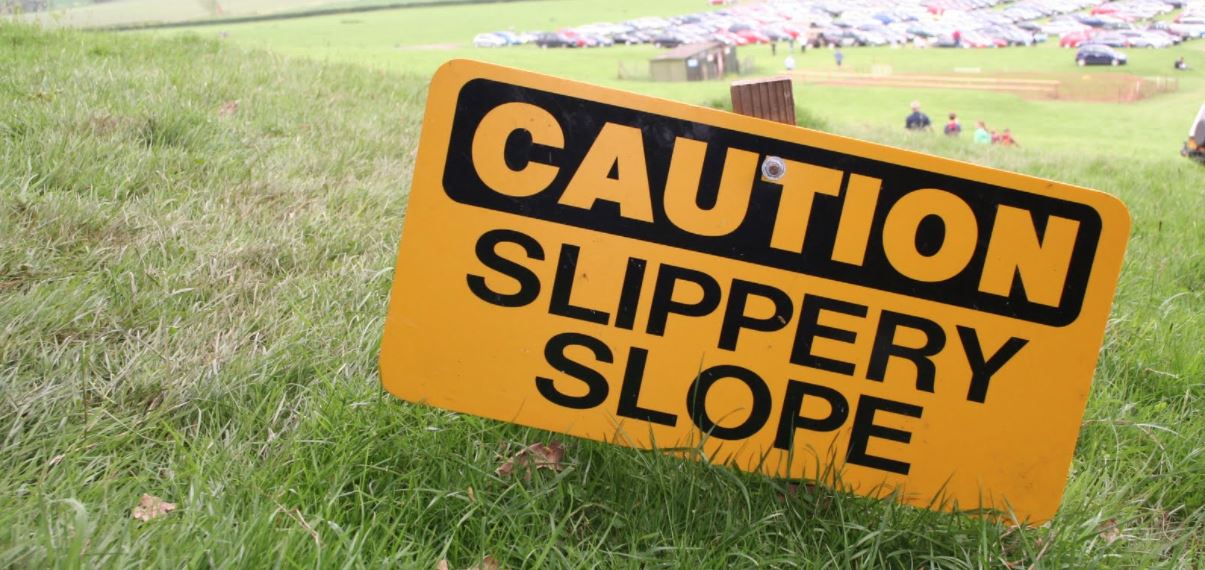
by Fr. Lawrence Farley
One of the many things I do not understand is why argument from experience is sometimes dismissed out of hand. In the debate about deaconesses, for example, when one argues from past experience that one thing inevitably (or at least most of the time) leads to another so that ordaining deaconesses in Orthodoxy in North America now would lead to the ordination of women to the priesthood later (as it did in every other historic Christian denomination in the West) the argument is simply disallowed. No counter-argument is offered; no demonstration that what happened in every other western church could never happen in Orthodoxy. It is apparently felt that no counter-argument is necessary. All that is required to dismiss the argument is the recitation of the magic words “That’s Just the Slippery Slope Argument” and hey presto!—no further response is required.
The guilty Slippery Slope Argument goes under other aliases as well, known in some disreputable quarters as “The Thin Edge of the Wedge Argument” and, more recently, as “The Camel’s Nose Argument” (named for the camel’s proverbial ability to enter a tent by first poking its nose under the bottom before entering). It is also derided more succinctly as “scare tactics”, the words of which when uttered free the utterer from the heavy burden of proving that there is nothing of which to be actually scared.
Sometimes the strategy is personalized, with the suggestion that the person warning about the Slippery Slope is subject to personal weakness. One writer posited that when discussing the ordination of women users of the Slippery Slope argument were suffering from a kind of Episcopal Post-Traumatic Stress Disorder despite the absence of such a diagnosis in the latest DSM-5. One is left to imagine that the sufferers from this affliction begin to shake when they see an Anglican Prayer Book or when they hear Cathedral Evensong.
The entire refusal to weigh experience is odd, because in every other part of life experience is accepted as qualifying, not as disqualifying. That is, after all, one of the main reasons why we teach history. We accept the maxim that
“those who don’t learn from history are bound to repeat it”
and so we do our best to learn from history. Having seen from the experience of Prime Minister Neville Chamberlain, for example, that his appeasement of aggression did not work out so well as he had hoped, we now cite his mistake and try to learn from it, and we now warn of the dangers of appeasement. Sometimes two situations are so different from one another that no comparison between them is possible and the lesson learned from the earlier situation does not apply to the later one. But this dissimilarity must be proven, not simply stated or assumed. It could be that Orthodoxy in North America is so vastly different from Episcopalianism and Lutheranism in North America that the former can learn nothing from the experiences of the latter. But we would still need to have this vast difference demonstrated. It certainly cannot be found in degrees of holiness or learning. What makes us so special as to be immune to the forces that afflicted and conquered our neighbours?
The discounting of those warning of the Slippery Slope is all the odder in the case of deaconesses because we don’t have to wonder about whether or not those currently pushing for deaconesses will also push later for priestesses. They have already told us that they will. The writings of such feminist authors as Behr-Sigel and her later compatriots make no secret of their agenda and final goals. If the diaconal inch is given, they are clear that they will next demand the presbyteral mile. One scarcely requires Protestant history to see where this will lead when we have so much current Orthodox clamour. One doesn’t need to look into a crystal ball to see the future, only into the pages of Public Orthodoxy.
It is difficult to avoid the conclusion that those denouncing the invocation of experience do so because they can think of little else to say by way of refutation. Certainly their arguments from Scripture and the Fathers, when occasionally cited, are so thin as to be actually porous. I cannot help but think of a quote from CS Lewis when he was dealing with the liberal Biblical critics of his own day:
“Whatever these men may be as Biblical critics, I distrust them as critics”.
Lewis was referring to their spectacular insensitivity to the quality of the texts they were reading, and he concluded that he was “sceptical about their authority”, saying that it was
“hard to persevere in a close study when you can work up no prima facie confidence in your teachers”.
I find myself in a similar situation: when men make such elemental errors (as for example the failure to recognize that the Trinitarian theology of the Cappadocian Fathers included an element of subordinationism), it is hard to work up confidence in their ability to interpret the significance of the immediate past. I have no doubt they are good and well-intentioned men, but I distrust them as teachers. And I want to ask with our Lord,
“Why do you not know how to interpret the present time?” (Luke 12:56).
Source